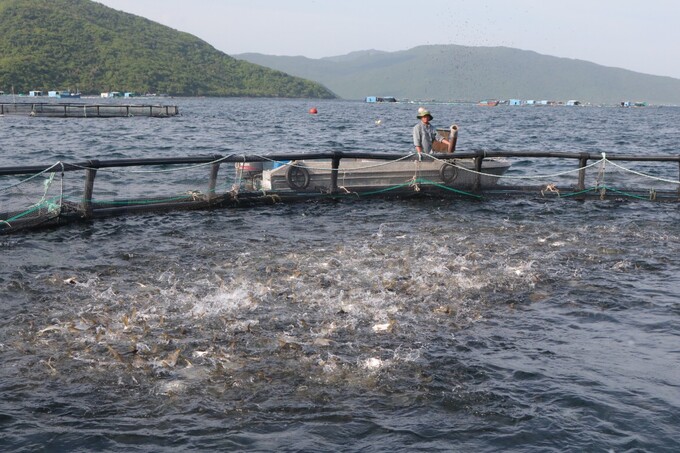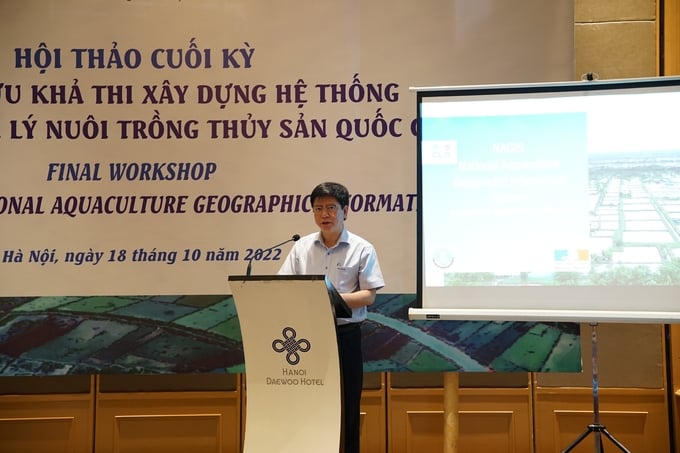May 19, 2025 | 07:53 GMT +7
May 19, 2025 | 07:53 GMT +7
Hotline: 0913.378.918
May 19, 2025 | 07:53 GMT +7
Hotline: 0913.378.918
On October 17, MARD, in collaboration with the French Embassy in Vietnam and CLS Group, hosted the Final Workshop Feasibility Study for the National Aquaculture Geographic Information System (NAGIS).
The purpose of the workshop is to report the project's outcomes after 18 months of implementation, beginning in May 2021, and to propose future ideas and technological improvements for the NAGIS system. The French Ministry of Finance and the Natixis bank supported the effort, which was carried out in Vietnam by MARD, DFish, and CLS Group.

The NAGIS project will provide important information platforms for identifying aquaculture areas in Vietnam. Photo: Kim So.
Vietnam aims for the fisheries industry to contribute between 28 and 30 percent of agricultural GDP by 2030; overall fishing production reaches 9.8 million tons, including 7 million tons from aquaculture and 2.8 million tons from exploitation. However, the challenge for the seafood industry is to ensure both output and sustainable production, as well as environmental quality and export market competitiveness. As a result, management of aquaculture activities in many aspects, such as cultivated area, seed, and water quality, is essential, especially in light of climate change's importance to the fisheries sector.
On this basis, the NAGIS project with the goal of creating a geographic information system to develop a map of planning, management, and monitoring of aquaculture activities in the Mekong Delta in the early stages and on a national scale in the future is fully consistent with the development orientation of the local fisheries industry and aquaculture industry. Thanks to sophisticated technology, this is a useful tool for fisheries management organizations to formulate specialized regulations based on precise scientific analyses and data.
Mr. Pham Ngoc Mau, Deputy Director of the Department of International Cooperation (Ministry of Agriculture and Rural Development), asserts that France is one of the world's leaders in the development and implementation of remote sensing technology. This technology provides environmental parameters on the surface of the water in order to help the marine economy, offshore fishing, and natural disaster response. Programs financed by France, such as technical assistance projects like NAGIS, can aid Vietnam in realizing its development direction along a sustainable agroforestry-fishery chain.

Mr. Pham Ngoc Mau, Deputy Director of the Department of International Cooperation (Ministry of Agriculture and Rural Development) spoke at the event. Photo: Linh Linh.
Mr. Nhu Van Can, Director of the Aquaculture Department (Directorate of Fisheries), stated that this is an essential feasibility research project with the objective of building and supporting a technical basis for management. Aquaculture as development planning; aquaculture mapping, monitoring, and management to mitigate climate change-related hazards. This platform integrates multiple datasets, including aquaculture productivity, water quality in breeding ponds, and climate predictions. Thus, the construction of water quality monitoring stations and the transmission of data about the following physicochemical parameters is a component of the project: temperature, dissolved oxygen, salinity, pH, redox potential, and turbidity.
In this regard, D-FISH, the Vietnamese government organization responsible for national fisheries, has chosen two farms. The first farm is located in Soc Trang, while the second is in Bac Lieu.
Taking advantage of a shift in the manufacturing cycle, CLS Group established two monitoring stations dedicated to water quality in March. These stations, provided by Bioceanor, enable real-time monitoring of water quality and, eventually, the prediction of its 48-hour development. They allow producers to precisely and dynamically manage their ponds and are a dependable tool for adapting to environmental and human outputs.
In addition to providing farmers with assistance, these sensors also offer DFISH an overview of the state of the ponds, as the data is automatically gathered and communicated to the NAGIS system for a weekly and ongoing examination of the evolution of water quality.
Mr. Pierre Martin, Deputy Economic Counselor at the French Embassy, has determined that the NAGIS project is one of the most ambitious aquaculture-related initiatives undertaken by CLS Group and the Ministry of Agriculture and Rural Development over the previous decade.
The project's objective is to design a tool to support aquaculture planning, with the goal of constructing a list of aquaculture sites using high-resolution satellite images, proposing solutions based on information collected through advanced spatial analysis to promote sustainability in the context of climate change and sea level rise in the Mekong Delta region, and supplying key indicators of trends and security vulnerabilities for established manufacturing systems, according to Mr. Martin.
Translated by Dieu Linh

(VAN) 14 out of 35 domesticated elephants in Dak Lak province have had their living conditions improved, with 11 of them currently participating in the non-riding elephant tourism model.

(VAN) Muong Nhe Nature Reserve hopes that being upgraded to a national park will lay the foundation for forest protection efforts to be carried out in a systematic, modern, and sustainable manner.
/2025/05/16/3923-2-171845_52.jpg)
(VAN) Lower costs, higher yields, and improved soil quality are outstanding benefits that soybeans bring when integrated into the crop rotation system.

(VAN) The 'For a Green National Environment' programme aims to promote a green lifestyle, support businesses in implementing ESG practices, and turn Net Zero commitments into concrete actions.

(VAN) Cold-barn systems efficiently manage environmental and temperature conditions, which aids in the prevention of respiratory diseases in pigs and protects them from the vectors that transmit African swine fevers.

(VAN) To tackle challenges, the project 'Addressing key technical bottlenecks in the grouper supply chain in Vietnam' has been underway since 2024.

(VAN) The project 'Disease-Resilient and Sustainable Cassava Production Systems in the Mekong Region', funded by the Australian Center for International Agricultural Research (ACIAR), is being implemented from 2024 to 2028.